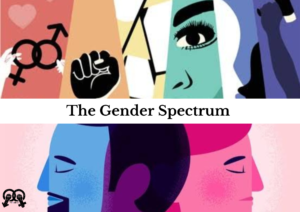“I am not free while any woman is unfree, even when her shackles are very different from my own.”
Aude Lorde, 1981, Dare to be Powerful
What is Bodily Autonomy and Why does it matter for everyone?
With the recent overturning of the judgment in the landmark case Roe v. Wade case, the legal right to abortion has been taken away in the US. This has raised serious questions about women’s reproductive rights. According to the World Economic Forum and United Nations Population Fund Report, roughly half of all women reportedly lack the ability to freely make choices about their own bodies without facing coercion and violence. In the 57 countries surveyed, the proportion of women aged 15 to 49 who were able to make autonomous decisions with regard to sex with partners, contraception and healthcare went as low as 7%. This also explains the forced departure from a country to terminate their pregnancies. Moreover, as many as four million girls were subjected to female genital mutilation. These examples depict the clear violation of the right to bodily autonomy.
Have you ever come across organisations having strict policies regarding dress codes and body piercings? If you have been a victim of this, then yes, you’re being denied your right to bodily autonomy. Bodily Autonomy arises from the belief that one’s body is one’s own. It’s about power, and it’s about agency. It’s about choice and dignity. It’s a foundation for gender equality and a fundamental right. Bodily autonomy is an essential element of building more equitable societies as the right to reproductive autonomy is at the core of basic rights to privacy and bodily integrity. Acts of bodily autonomy include choosing how you dress, express yourself and make decisions for your health. Most importantly, it applies to all of us!

What does the right to bodily autonomy entail?
Right to bodily autonomy may entail the following:
- Freedom from any form of violence and prejudice, which means that one’s physical safety is protected, including even the ones engaged in sex work, disabled people and immigrants with HIV.
- Power to control labour, which means that everyone has the right to paid sick leave, disability leave, and family leave without any discrimination based on sex, gender or other forms of identity.
- Freedom of expression for gender orientation: This entails the right to recognition in public life without transphobic violence irrespective of gender orientation. It includes the right to participate in social, economic and political aspects of society on an equal footing.
- Freedom to make decisions in relationships and form families.
The three principles of bodily autonomy are:

- Universality :
It means that the right to bodily autonomy is for all people regardless of their gender, race, sexuality and body. The fight for bodily autonomy is the fight for the rights of women, the LGBTQ+ community and differently-abled people. It is exercised at every place of your being, from the workplace, home and even the web!
- Autonomy:
According to E. Barry, The State of Abortion Rights Around the World, 2021, globally 24 countries have a total ban on abortion, which means that around 90 million people of reproductive age are unable to access safe abortion legally. This puts a big question mark on a person’s reproductive rights.
Autonomy includes questions about how one makes choices independently about medical treatment and health. It includes the concept of reproductive justice, which means one’s autonomy to control one’s gender, sexuality and reproduction.
The umbrella of Reproductive Justice includes the right to have children or not. The policing of reproduction arises from the rigid patriarchal and conservative mindsets embedded in our healthcare system. The sexual minorities and other marginalized sections of the society suffer disproportionately from the lack of bodily autonomy.
- Agency :
Agency pertains to one’s power and influence over their own body. The latest technology, especially smartwatches, enables individuals to manage their well-being, therefore empowering them to take control of their bodies. This has also raised concerns about data privacy. The recent advancements in biotechnology and genetic engineering pose ethical challenges. For example: should parents have the right to edit their unborn child’s genes to enhance its abilities?
How can we achieve the Right to Bodily Autonomy?
- Legal enshrinement of abortion rights and equitable access to services.
- Equitable access to family planning services, maternity health services and choices of contraceptives.
- Comprehensive sexual health education from a young age.
- Value consent.
- Supporting organisations and participating in awareness organisations that advocate for human rights.
- Building a supportive community which would be a safe space for discussions on challenges around bodily autonomy.

To conclude, bodily autonomy is the foundation for gender equality. In short, it means we have complete control over what does and what doesn’t happen to our bodies. The status of bodily autonomy across the world is indeed in a grim state, but the positive thing is we can still change it. At a milestone conference at the 1995 UN World Conference on Women, the importance of bodily autonomy was recognised universally.
“Our human rights, mental wellness and futures all depend on bodily autonomy.”
UNFPA, 2021
Authorship Credits
Sourishree Ghosh is currently pursuing her bachelor’s in Political Science from Jadavpur University, Kolkata. She is passionate about social and political issues and loves to write about them. Her hobbies include reading fiction books, painting, sketching and creative writing.





